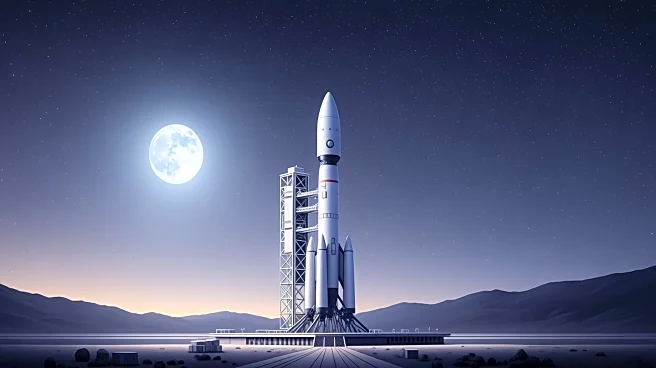What's Happening?
Oman's Civil Aviation Authority (CAA) has introduced a new procedure to expedite the licensing of space launches, marking a significant step towards establishing the nation as a premier commercial space hub
in the Middle East. The newly approved process allows for applications to be processed within 45 days, which is among the fastest timelines globally. This regulation does not limit the number of launches from Omani soil, potentially increasing the frequency of space activities in the region. The Etlaq Spaceport, managed by Oman’s National Space Services Company, is set to host various types of launches, including suborbital and orbital flights, catering to micro, small, medium, and heavy launchers targeting different orbital paths. The spaceport has already hosted NASCOM’s suborbital Duqm-1 rocket launch and is preparing for future missions, including the MIURA 5 micro-launcher by Spanish startup PLD Space.
Why It's Important?
The fast-tracking of space launch licenses by Oman’s CAA is poised to significantly impact the global space industry by providing a new, efficient launch site in the Middle East. This development could attract international space companies seeking quicker and more flexible launch options, thereby boosting Oman’s economy and technological standing. The initiative reflects a growing trend of countries investing in space infrastructure to capitalize on the burgeoning commercial space sector. For the U.S., this could mean increased competition in the space launch market, potentially affecting American companies that rely on international partnerships for satellite deployment and other space missions.
What's Next?
Oman’s move to streamline space launch licensing is likely to attract more global interest and investment in its spaceport facilities. As the Etlaq Spaceport begins hosting more launches, stakeholders in the space industry, including satellite companies and launch service providers, may consider Oman as a viable alternative to traditional launch sites. This could lead to increased collaboration between Oman and other countries, including the U.S., in space exploration and technology development. Additionally, the success of this initiative may prompt other nations to adopt similar fast-track licensing procedures to enhance their competitiveness in the space sector.
Beyond the Headlines
Oman's strategic decision to enhance its space launch capabilities may have broader implications for regional geopolitics and international space governance. As more countries develop space infrastructure, there could be increased dialogue and cooperation on space traffic management and sustainability. This move also highlights the importance of regulatory frameworks in facilitating technological advancements and international partnerships in space exploration.











